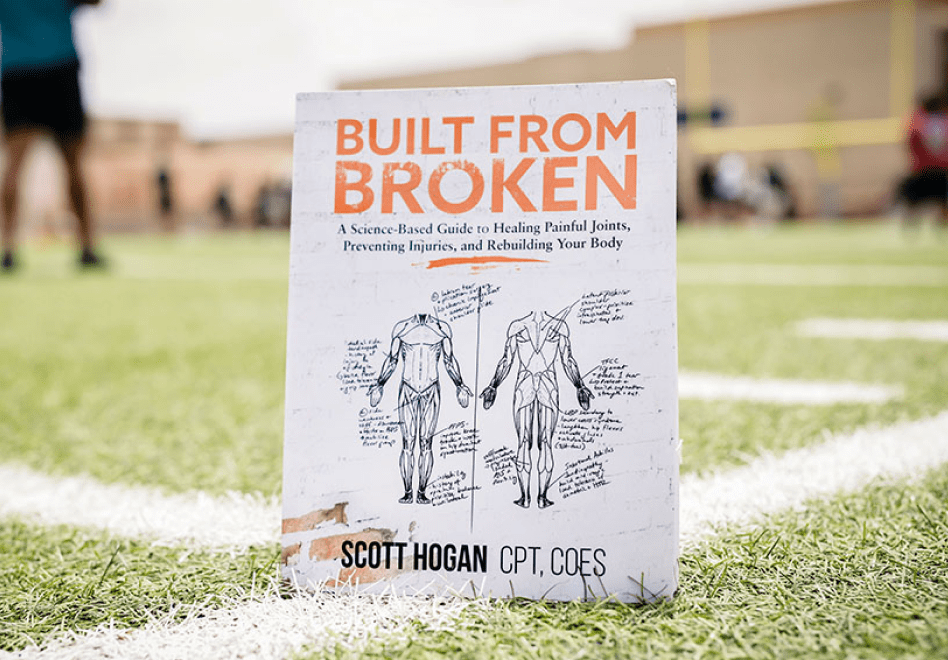
Be built (to last).
The right supplements can help you recover naturally and build a resilient body.

Supplement Quiz
Take this short quiz to discover the perfect supplements for your needs and goals.
About SaltWrap

Built from Broken
Get the best-selling book from SaltWrap founder, Scott Hogan, and start rebuilding today.
Is Grass-Fed Better for You?
By Joe Zagami
We’ve all seen the rise of grass-fed food products in recent years. What was once mostly a niche category found only in boutique grocers or online has exploded into the mainstream.
But whether you’ve never bought grass-fed, or refuse to buy anything else, we’ve all had the same question at some point: are they really any better than their conventional counterparts?
Let’s dig in and find out.
Before We Begin...
Before we dive into the ins and outs of the grass-fed moniker, let’s quickly address a couple of things.
For starters, what do we mean by “better?”
No need to get philosophical here. We simply mean “higher in beneficial nutrients that can help boost physical performance and optimize overall health.”
Easy enough, right?
But importantly, we also mean “lower in unwanted byproducts that can quietly chip away at performance, health, and even longevity over time.”
You know… Better.
One more thing worth mentioning. We’re not talking about anything other than purported physical health and performance benefits. So, you won’t find us pontificating about the moral and ethical implications of industrial agriculture (factory farming) or its effects on our planet.
Frankly, that’s out of our wheelhouse.
But for the record, we wish the agricultural industry at large – especially in the U.S. – was incentivized to practice regenerative farming. Joel Salatin of Polyface Farms is one of the loudest and most successful voices in this movement, and we tend to believe he’s got it right.
Now that we’ve got the housekeeping stuff out of the way, let’s start with the most important question of all…
What Does Grass-Fed Mean?
According to the USDA, in the context of meat, the “grass-fed” designation means:
“That grass and forage shall be the feed source consumed for the lifetime of the ruminant animal, with the exception of milk consumed prior to weaning. The diet shall be derived solely from forage consisting of grass (annual and perennial), forbs (e.g., legumes, Brassica), browse, or cereal grain crops in the vegetative (pre-grain) state. Animals cannot be fed grain or grain byproducts and must have continuous access to pasture during the growing season.”1
What about milk?
According to the University of Minnesota, grass-fed milk (or “grassmilk,” as they call it) comes from cows with a nearly 100% forage-based diet.
So, pretty much the same deal as grass-fed beef. But importantly, they point out that these cows may also receive minerals and other supplements – like molasses – in small amounts.2
What does this mean?
In short, it means that for most of its life, the animal’s diet must consist of grass. But there’s some wiggle room. The diet doesn’t have to consist solely of grass. In fact, during the non-grazing season, they may eat oats, barley, and alfalfa.
So, it might be more accurate (and honest) to say something like, “from grain-free cows.”
Another potentially confusing factor is that “grass-fed” does not equal “organic.”
If you don’t see the USDA Organic certification on your product – whether it’s meat or milk – the grass (or other grain-free food source) the animal grazed on might be exposed to pesticides and other potentially harmful chemicals.
In other words, if your grass-fed product isn’t also certified organic, you may not be doing your health any favors.
Ok, now we’re all up to speed. And let’s now assume that you’ve found a grass-fed organic product that you trust…
Is it really any better for you?
Is Grass-Fed Better?
Personal feelings and ethical arguments aside, red meat is like a superfood for athletes and active people.
Beef is an excellent source of complete protein (i.e., it contains the nine amino acids we need to get from food) and healthy fats. (No, saturated fats are not evil.)
It’s also rich in vitamins and micronutrients, including iron (which helps your blood carry oxygen) and zinc (which supports immunity and healing).
But grass-fed beef is better because it takes this nutrition to the next level:
-
It’s higher in vitamins A and E, as well as antioxidants like glutathione3, 4
-
It’s lower in total fat content yet contains about twice as much conjugated linoleic acid (CLA) and has a better ratio of healthy omega-3 to omega-6 fatty acids5, 6
It’s higher in protein and lower in calories
Again, what about milk?
It's a similar story. One recent study found that grass-fed milk has more CLA and omega-3 fatty acids than conventional milk.
Plus, some phytonutrients, like carotenoids and tocopherols, are either lower in conventional milk or absent entirely.7
Putting It All Together
Yes, there are differences between grass-fed beef and conventional beef. There are differences between grass-fed milk and conventional milk, too.
But for our purposes, the main difference is this:
Grass-fed products are more nutritious, which ultimately makes them the better choice for athletes and active people.
This doesn’t mean you should never buy conventional milk or beef ever again.
But if you have the choice – and the means – to regularly buy the more beneficial and nutritious version of a food that’s already a staple in your diet, why wouldn’t you at least give it a try?
You might notice small but significant changes in how you feel and perform over time.
And if you want to take your efforts to another level entirely, you need to check out Organ Therapy™.
Simply put, organ meats are nature’s most potent superfoods.
They can contain up to 100x the nutritional content of their muscle meat counterparts. It’s why many of our ancestors preferred organs over muscle.
Yet our modern diets neglect this primal nutrition our bodies crave.
This is exactly why we created Organ Therapy™.
Founder: Scott Hogan

I created SaltWrap to bring together the most practical ideas in therapeutic sports nutrition, corrective exercise, and functional fitness — with the goal of keeping you (and myself) strong, mobile, and built to last.
I've worked as an A.C.E. Certified Personal Trainer, Orthopedic Exercise Specialist, and nutritional supplement formulator.
But more importantly — I've spent most of my life battling injuries, joint pain, and just being plain beat up. So I know what it's like to struggle toward fitness goals.
SaltWrap is here to push you through injuries, setbacks and perceived physical limitations. To a place beyond what you think you're capable of. Sign up here to stay in the loop.
Learn more about my best-selling injury prevention and recovery book, Built from Broken.








